Solent University QHO420 Essay: Control, Power, Influence Analysis
VerifiedAdded on 2022/12/15
|8
|2346
|299
Essay
AI Summary
This essay investigates the relative importance of control, power, and influence within an organizational context. It begins by defining these three concepts and highlighting their individual contributions to organizational success. The essay then delves into theoretical frameworks, including French and Raven's five forms of power and McKinsey's change management influence model, to provide a deeper understanding of how power and influence function in practice. A case study of Tesco is used to exemplify the concepts discussed. The analysis emphasizes that power, as defined by the organizational structure, is the most critical factor as it defines roles and responsibilities and influences behavior. The essay concludes by summarizing the impact of control, power, and influence on organizational performance, highlighting the importance of all three elements while arguing for the primacy of power in achieving organizational goals. The essay also references several academic sources to support its claims.
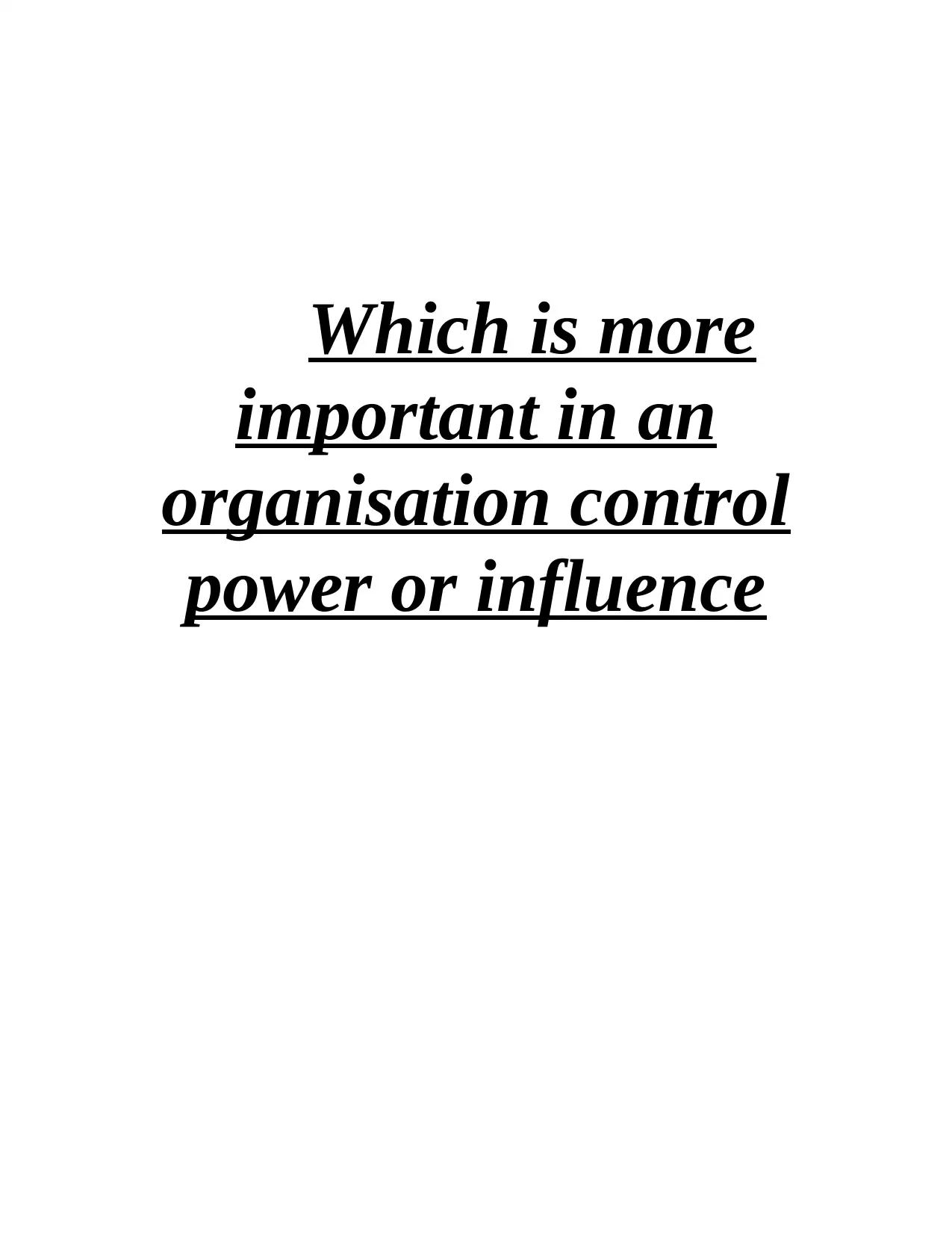
Which is more
important in an
organisation control
power or influence
important in an
organisation control
power or influence
Paraphrase This Document
Need a fresh take? Get an instant paraphrase of this document with our AI Paraphraser
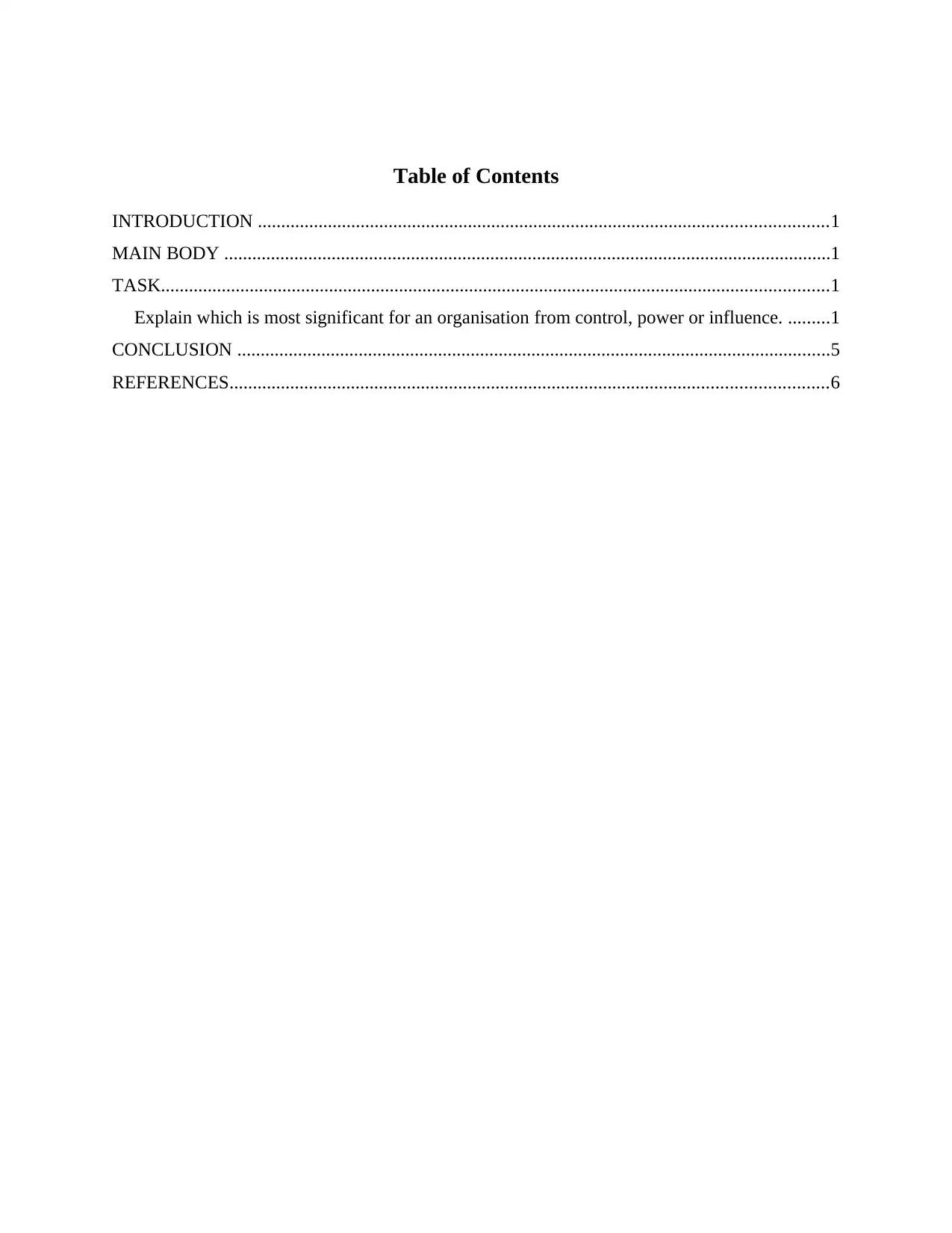
Table of Contents
INTRODUCTION ..........................................................................................................................1
MAIN BODY ..................................................................................................................................1
TASK...............................................................................................................................................1
Explain which is most significant for an organisation from control, power or influence. .........1
CONCLUSION ...............................................................................................................................5
REFERENCES................................................................................................................................6
INTRODUCTION ..........................................................................................................................1
MAIN BODY ..................................................................................................................................1
TASK...............................................................................................................................................1
Explain which is most significant for an organisation from control, power or influence. .........1
CONCLUSION ...............................................................................................................................5
REFERENCES................................................................................................................................6
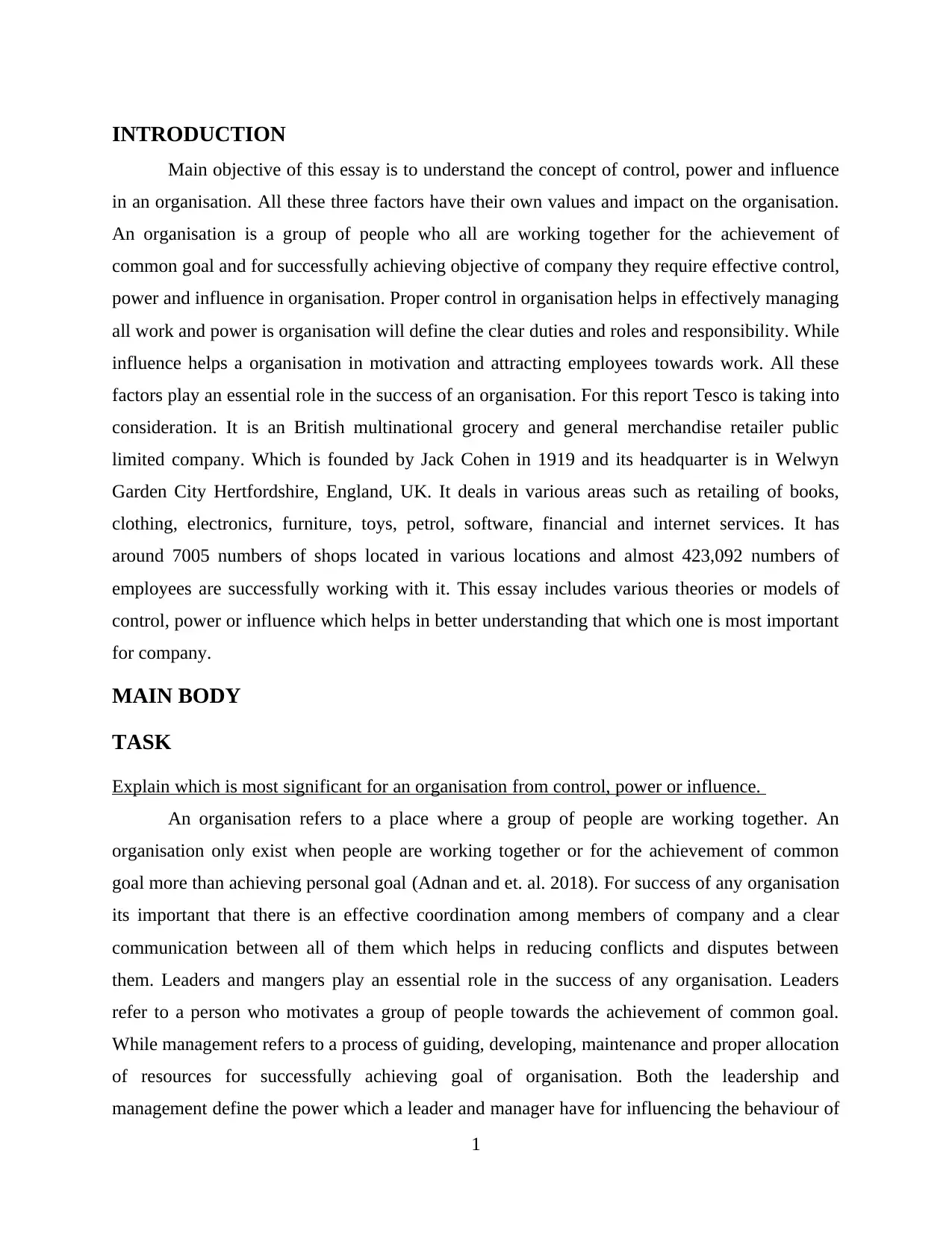
INTRODUCTION
Main objective of this essay is to understand the concept of control, power and influence
in an organisation. All these three factors have their own values and impact on the organisation.
An organisation is a group of people who all are working together for the achievement of
common goal and for successfully achieving objective of company they require effective control,
power and influence in organisation. Proper control in organisation helps in effectively managing
all work and power is organisation will define the clear duties and roles and responsibility. While
influence helps a organisation in motivation and attracting employees towards work. All these
factors play an essential role in the success of an organisation. For this report Tesco is taking into
consideration. It is an British multinational grocery and general merchandise retailer public
limited company. Which is founded by Jack Cohen in 1919 and its headquarter is in Welwyn
Garden City Hertfordshire, England, UK. It deals in various areas such as retailing of books,
clothing, electronics, furniture, toys, petrol, software, financial and internet services. It has
around 7005 numbers of shops located in various locations and almost 423,092 numbers of
employees are successfully working with it. This essay includes various theories or models of
control, power or influence which helps in better understanding that which one is most important
for company.
MAIN BODY
TASK
Explain which is most significant for an organisation from control, power or influence.
An organisation refers to a place where a group of people are working together. An
organisation only exist when people are working together or for the achievement of common
goal more than achieving personal goal (Adnan and et. al. 2018). For success of any organisation
its important that there is an effective coordination among members of company and a clear
communication between all of them which helps in reducing conflicts and disputes between
them. Leaders and mangers play an essential role in the success of any organisation. Leaders
refer to a person who motivates a group of people towards the achievement of common goal.
While management refers to a process of guiding, developing, maintenance and proper allocation
of resources for successfully achieving goal of organisation. Both the leadership and
management define the power which a leader and manager have for influencing the behaviour of
1
Main objective of this essay is to understand the concept of control, power and influence
in an organisation. All these three factors have their own values and impact on the organisation.
An organisation is a group of people who all are working together for the achievement of
common goal and for successfully achieving objective of company they require effective control,
power and influence in organisation. Proper control in organisation helps in effectively managing
all work and power is organisation will define the clear duties and roles and responsibility. While
influence helps a organisation in motivation and attracting employees towards work. All these
factors play an essential role in the success of an organisation. For this report Tesco is taking into
consideration. It is an British multinational grocery and general merchandise retailer public
limited company. Which is founded by Jack Cohen in 1919 and its headquarter is in Welwyn
Garden City Hertfordshire, England, UK. It deals in various areas such as retailing of books,
clothing, electronics, furniture, toys, petrol, software, financial and internet services. It has
around 7005 numbers of shops located in various locations and almost 423,092 numbers of
employees are successfully working with it. This essay includes various theories or models of
control, power or influence which helps in better understanding that which one is most important
for company.
MAIN BODY
TASK
Explain which is most significant for an organisation from control, power or influence.
An organisation refers to a place where a group of people are working together. An
organisation only exist when people are working together or for the achievement of common
goal more than achieving personal goal (Adnan and et. al. 2018). For success of any organisation
its important that there is an effective coordination among members of company and a clear
communication between all of them which helps in reducing conflicts and disputes between
them. Leaders and mangers play an essential role in the success of any organisation. Leaders
refer to a person who motivates a group of people towards the achievement of common goal.
While management refers to a process of guiding, developing, maintenance and proper allocation
of resources for successfully achieving goal of organisation. Both the leadership and
management define the power which a leader and manager have for influencing the behaviour of
1
⊘ This is a preview!⊘
Do you want full access?
Subscribe today to unlock all pages.

Trusted by 1+ million students worldwide
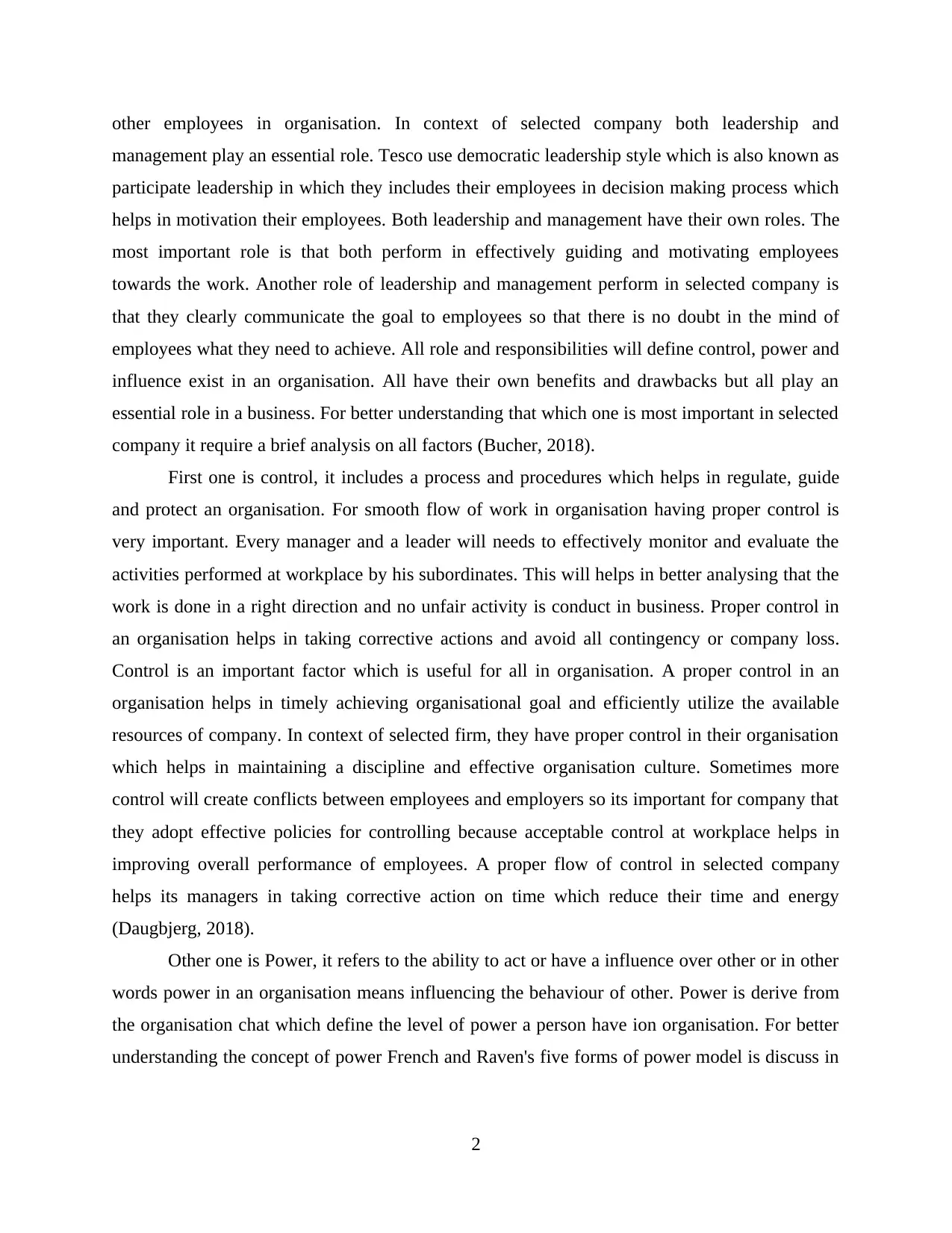
other employees in organisation. In context of selected company both leadership and
management play an essential role. Tesco use democratic leadership style which is also known as
participate leadership in which they includes their employees in decision making process which
helps in motivation their employees. Both leadership and management have their own roles. The
most important role is that both perform in effectively guiding and motivating employees
towards the work. Another role of leadership and management perform in selected company is
that they clearly communicate the goal to employees so that there is no doubt in the mind of
employees what they need to achieve. All role and responsibilities will define control, power and
influence exist in an organisation. All have their own benefits and drawbacks but all play an
essential role in a business. For better understanding that which one is most important in selected
company it require a brief analysis on all factors (Bucher, 2018).
First one is control, it includes a process and procedures which helps in regulate, guide
and protect an organisation. For smooth flow of work in organisation having proper control is
very important. Every manager and a leader will needs to effectively monitor and evaluate the
activities performed at workplace by his subordinates. This will helps in better analysing that the
work is done in a right direction and no unfair activity is conduct in business. Proper control in
an organisation helps in taking corrective actions and avoid all contingency or company loss.
Control is an important factor which is useful for all in organisation. A proper control in an
organisation helps in timely achieving organisational goal and efficiently utilize the available
resources of company. In context of selected firm, they have proper control in their organisation
which helps in maintaining a discipline and effective organisation culture. Sometimes more
control will create conflicts between employees and employers so its important for company that
they adopt effective policies for controlling because acceptable control at workplace helps in
improving overall performance of employees. A proper flow of control in selected company
helps its managers in taking corrective action on time which reduce their time and energy
(Daugbjerg, 2018).
Other one is Power, it refers to the ability to act or have a influence over other or in other
words power in an organisation means influencing the behaviour of other. Power is derive from
the organisation chat which define the level of power a person have ion organisation. For better
understanding the concept of power French and Raven's five forms of power model is discuss in
2
management play an essential role. Tesco use democratic leadership style which is also known as
participate leadership in which they includes their employees in decision making process which
helps in motivation their employees. Both leadership and management have their own roles. The
most important role is that both perform in effectively guiding and motivating employees
towards the work. Another role of leadership and management perform in selected company is
that they clearly communicate the goal to employees so that there is no doubt in the mind of
employees what they need to achieve. All role and responsibilities will define control, power and
influence exist in an organisation. All have their own benefits and drawbacks but all play an
essential role in a business. For better understanding that which one is most important in selected
company it require a brief analysis on all factors (Bucher, 2018).
First one is control, it includes a process and procedures which helps in regulate, guide
and protect an organisation. For smooth flow of work in organisation having proper control is
very important. Every manager and a leader will needs to effectively monitor and evaluate the
activities performed at workplace by his subordinates. This will helps in better analysing that the
work is done in a right direction and no unfair activity is conduct in business. Proper control in
an organisation helps in taking corrective actions and avoid all contingency or company loss.
Control is an important factor which is useful for all in organisation. A proper control in an
organisation helps in timely achieving organisational goal and efficiently utilize the available
resources of company. In context of selected firm, they have proper control in their organisation
which helps in maintaining a discipline and effective organisation culture. Sometimes more
control will create conflicts between employees and employers so its important for company that
they adopt effective policies for controlling because acceptable control at workplace helps in
improving overall performance of employees. A proper flow of control in selected company
helps its managers in taking corrective action on time which reduce their time and energy
(Daugbjerg, 2018).
Other one is Power, it refers to the ability to act or have a influence over other or in other
words power in an organisation means influencing the behaviour of other. Power is derive from
the organisation chat which define the level of power a person have ion organisation. For better
understanding the concept of power French and Raven's five forms of power model is discuss in
2
Paraphrase This Document
Need a fresh take? Get an instant paraphrase of this document with our AI Paraphraser
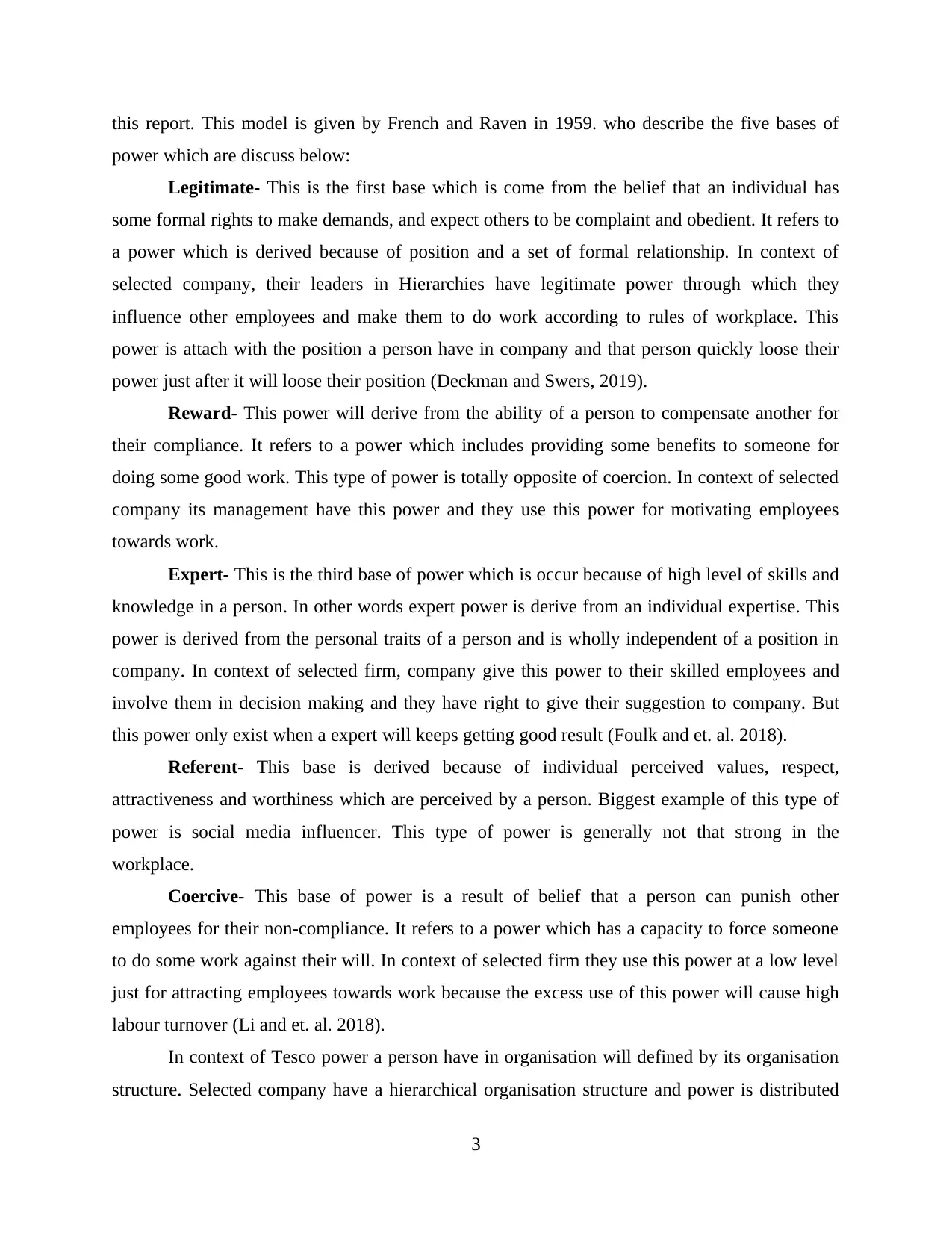
this report. This model is given by French and Raven in 1959. who describe the five bases of
power which are discuss below:
Legitimate- This is the first base which is come from the belief that an individual has
some formal rights to make demands, and expect others to be complaint and obedient. It refers to
a power which is derived because of position and a set of formal relationship. In context of
selected company, their leaders in Hierarchies have legitimate power through which they
influence other employees and make them to do work according to rules of workplace. This
power is attach with the position a person have in company and that person quickly loose their
power just after it will loose their position (Deckman and Swers, 2019).
Reward- This power will derive from the ability of a person to compensate another for
their compliance. It refers to a power which includes providing some benefits to someone for
doing some good work. This type of power is totally opposite of coercion. In context of selected
company its management have this power and they use this power for motivating employees
towards work.
Expert- This is the third base of power which is occur because of high level of skills and
knowledge in a person. In other words expert power is derive from an individual expertise. This
power is derived from the personal traits of a person and is wholly independent of a position in
company. In context of selected firm, company give this power to their skilled employees and
involve them in decision making and they have right to give their suggestion to company. But
this power only exist when a expert will keeps getting good result (Foulk and et. al. 2018).
Referent- This base is derived because of individual perceived values, respect,
attractiveness and worthiness which are perceived by a person. Biggest example of this type of
power is social media influencer. This type of power is generally not that strong in the
workplace.
Coercive- This base of power is a result of belief that a person can punish other
employees for their non-compliance. It refers to a power which has a capacity to force someone
to do some work against their will. In context of selected firm they use this power at a low level
just for attracting employees towards work because the excess use of this power will cause high
labour turnover (Li and et. al. 2018).
In context of Tesco power a person have in organisation will defined by its organisation
structure. Selected company have a hierarchical organisation structure and power is distributed
3
power which are discuss below:
Legitimate- This is the first base which is come from the belief that an individual has
some formal rights to make demands, and expect others to be complaint and obedient. It refers to
a power which is derived because of position and a set of formal relationship. In context of
selected company, their leaders in Hierarchies have legitimate power through which they
influence other employees and make them to do work according to rules of workplace. This
power is attach with the position a person have in company and that person quickly loose their
power just after it will loose their position (Deckman and Swers, 2019).
Reward- This power will derive from the ability of a person to compensate another for
their compliance. It refers to a power which includes providing some benefits to someone for
doing some good work. This type of power is totally opposite of coercion. In context of selected
company its management have this power and they use this power for motivating employees
towards work.
Expert- This is the third base of power which is occur because of high level of skills and
knowledge in a person. In other words expert power is derive from an individual expertise. This
power is derived from the personal traits of a person and is wholly independent of a position in
company. In context of selected firm, company give this power to their skilled employees and
involve them in decision making and they have right to give their suggestion to company. But
this power only exist when a expert will keeps getting good result (Foulk and et. al. 2018).
Referent- This base is derived because of individual perceived values, respect,
attractiveness and worthiness which are perceived by a person. Biggest example of this type of
power is social media influencer. This type of power is generally not that strong in the
workplace.
Coercive- This base of power is a result of belief that a person can punish other
employees for their non-compliance. It refers to a power which has a capacity to force someone
to do some work against their will. In context of selected firm they use this power at a low level
just for attracting employees towards work because the excess use of this power will cause high
labour turnover (Li and et. al. 2018).
In context of Tesco power a person have in organisation will defined by its organisation
structure. Selected company have a hierarchical organisation structure and power is distributed
3
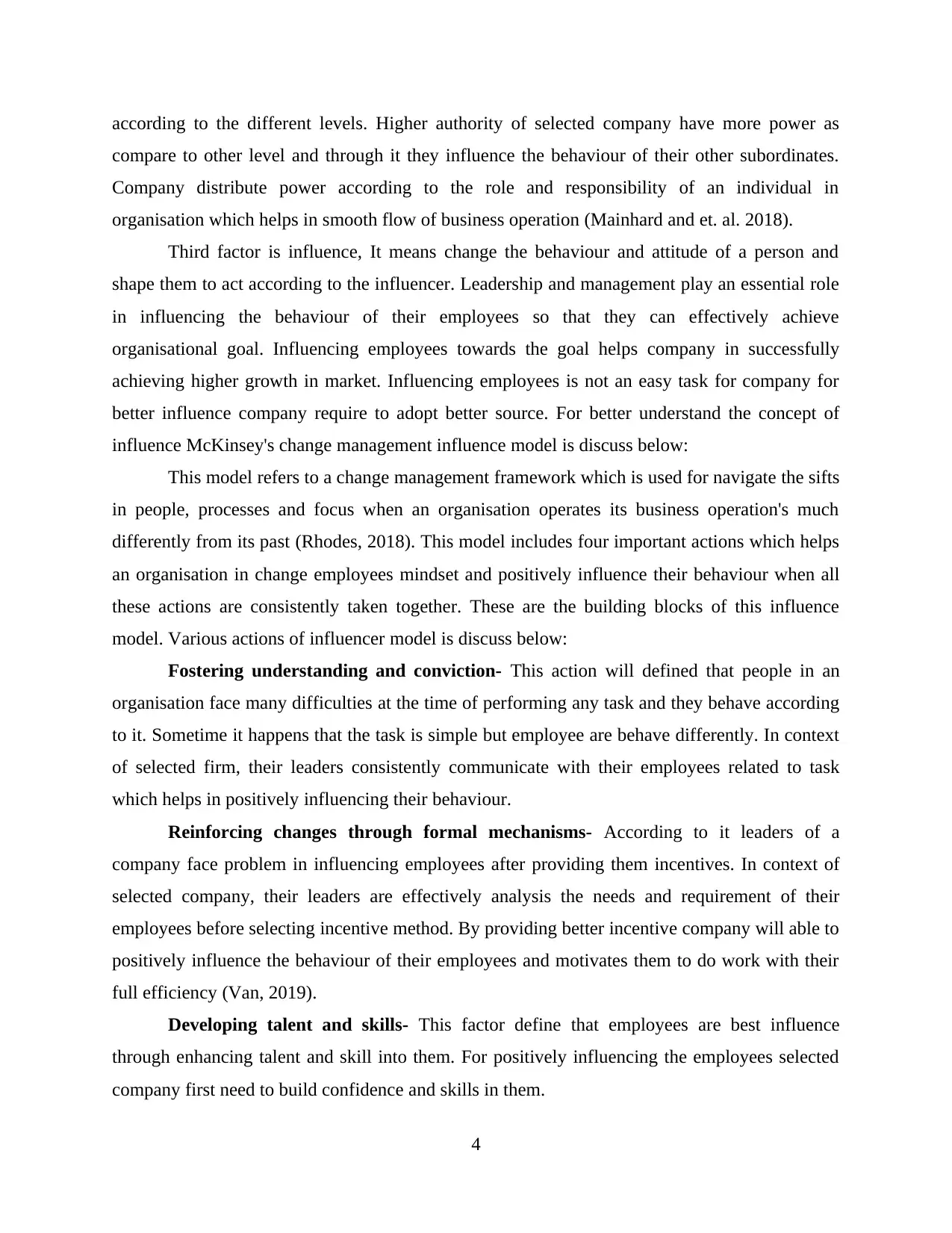
according to the different levels. Higher authority of selected company have more power as
compare to other level and through it they influence the behaviour of their other subordinates.
Company distribute power according to the role and responsibility of an individual in
organisation which helps in smooth flow of business operation (Mainhard and et. al. 2018).
Third factor is influence, It means change the behaviour and attitude of a person and
shape them to act according to the influencer. Leadership and management play an essential role
in influencing the behaviour of their employees so that they can effectively achieve
organisational goal. Influencing employees towards the goal helps company in successfully
achieving higher growth in market. Influencing employees is not an easy task for company for
better influence company require to adopt better source. For better understand the concept of
influence McKinsey's change management influence model is discuss below:
This model refers to a change management framework which is used for navigate the sifts
in people, processes and focus when an organisation operates its business operation's much
differently from its past (Rhodes, 2018). This model includes four important actions which helps
an organisation in change employees mindset and positively influence their behaviour when all
these actions are consistently taken together. These are the building blocks of this influence
model. Various actions of influencer model is discuss below:
Fostering understanding and conviction- This action will defined that people in an
organisation face many difficulties at the time of performing any task and they behave according
to it. Sometime it happens that the task is simple but employee are behave differently. In context
of selected firm, their leaders consistently communicate with their employees related to task
which helps in positively influencing their behaviour.
Reinforcing changes through formal mechanisms- According to it leaders of a
company face problem in influencing employees after providing them incentives. In context of
selected company, their leaders are effectively analysis the needs and requirement of their
employees before selecting incentive method. By providing better incentive company will able to
positively influence the behaviour of their employees and motivates them to do work with their
full efficiency (Van, 2019).
Developing talent and skills- This factor define that employees are best influence
through enhancing talent and skill into them. For positively influencing the employees selected
company first need to build confidence and skills in them.
4
compare to other level and through it they influence the behaviour of their other subordinates.
Company distribute power according to the role and responsibility of an individual in
organisation which helps in smooth flow of business operation (Mainhard and et. al. 2018).
Third factor is influence, It means change the behaviour and attitude of a person and
shape them to act according to the influencer. Leadership and management play an essential role
in influencing the behaviour of their employees so that they can effectively achieve
organisational goal. Influencing employees towards the goal helps company in successfully
achieving higher growth in market. Influencing employees is not an easy task for company for
better influence company require to adopt better source. For better understand the concept of
influence McKinsey's change management influence model is discuss below:
This model refers to a change management framework which is used for navigate the sifts
in people, processes and focus when an organisation operates its business operation's much
differently from its past (Rhodes, 2018). This model includes four important actions which helps
an organisation in change employees mindset and positively influence their behaviour when all
these actions are consistently taken together. These are the building blocks of this influence
model. Various actions of influencer model is discuss below:
Fostering understanding and conviction- This action will defined that people in an
organisation face many difficulties at the time of performing any task and they behave according
to it. Sometime it happens that the task is simple but employee are behave differently. In context
of selected firm, their leaders consistently communicate with their employees related to task
which helps in positively influencing their behaviour.
Reinforcing changes through formal mechanisms- According to it leaders of a
company face problem in influencing employees after providing them incentives. In context of
selected company, their leaders are effectively analysis the needs and requirement of their
employees before selecting incentive method. By providing better incentive company will able to
positively influence the behaviour of their employees and motivates them to do work with their
full efficiency (Van, 2019).
Developing talent and skills- This factor define that employees are best influence
through enhancing talent and skill into them. For positively influencing the employees selected
company first need to build confidence and skills in them.
4
⊘ This is a preview!⊘
Do you want full access?
Subscribe today to unlock all pages.

Trusted by 1+ million students worldwide
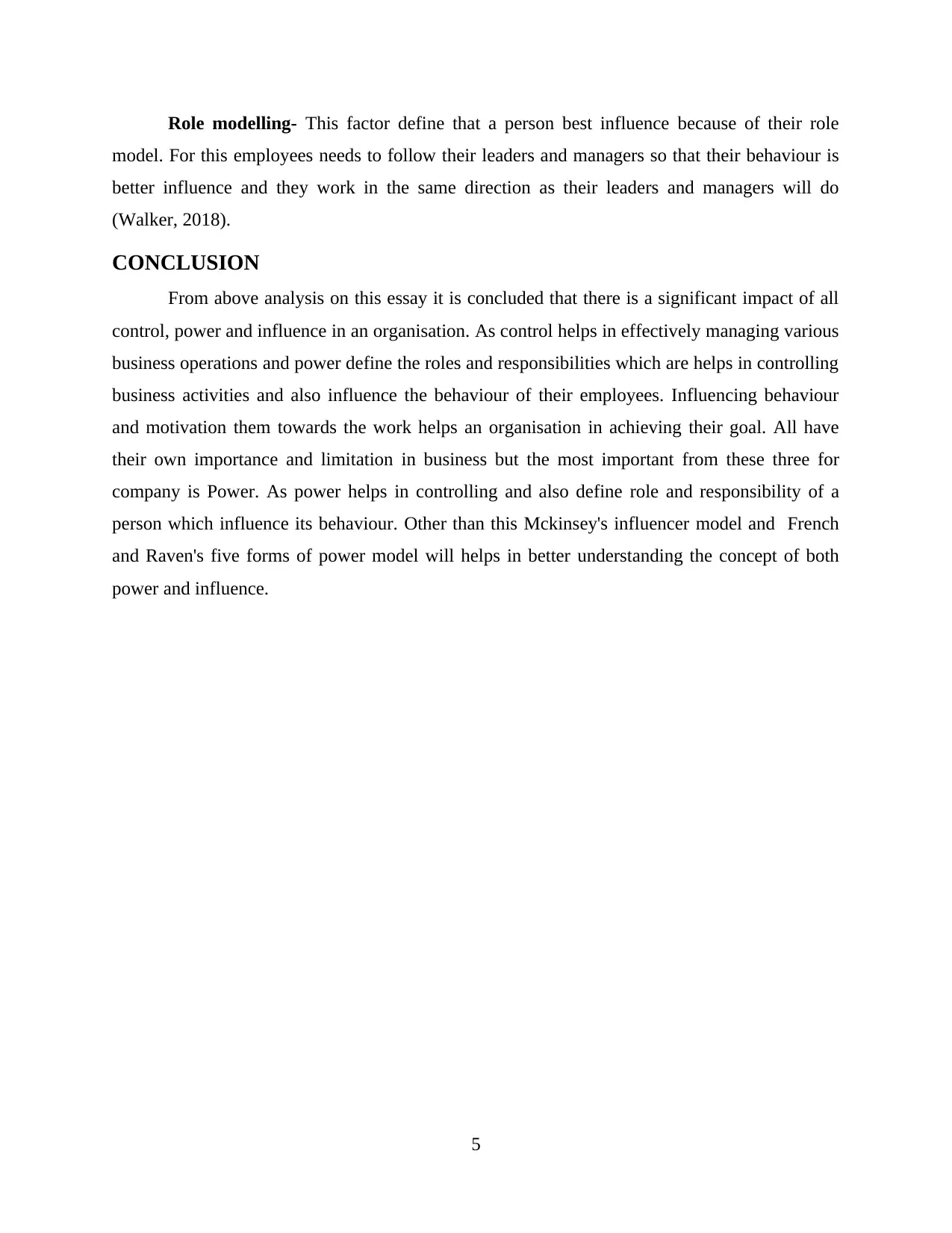
Role modelling- This factor define that a person best influence because of their role
model. For this employees needs to follow their leaders and managers so that their behaviour is
better influence and they work in the same direction as their leaders and managers will do
(Walker, 2018).
CONCLUSION
From above analysis on this essay it is concluded that there is a significant impact of all
control, power and influence in an organisation. As control helps in effectively managing various
business operations and power define the roles and responsibilities which are helps in controlling
business activities and also influence the behaviour of their employees. Influencing behaviour
and motivation them towards the work helps an organisation in achieving their goal. All have
their own importance and limitation in business but the most important from these three for
company is Power. As power helps in controlling and also define role and responsibility of a
person which influence its behaviour. Other than this Mckinsey's influencer model and French
and Raven's five forms of power model will helps in better understanding the concept of both
power and influence.
5
model. For this employees needs to follow their leaders and managers so that their behaviour is
better influence and they work in the same direction as their leaders and managers will do
(Walker, 2018).
CONCLUSION
From above analysis on this essay it is concluded that there is a significant impact of all
control, power and influence in an organisation. As control helps in effectively managing various
business operations and power define the roles and responsibilities which are helps in controlling
business activities and also influence the behaviour of their employees. Influencing behaviour
and motivation them towards the work helps an organisation in achieving their goal. All have
their own importance and limitation in business but the most important from these three for
company is Power. As power helps in controlling and also define role and responsibility of a
person which influence its behaviour. Other than this Mckinsey's influencer model and French
and Raven's five forms of power model will helps in better understanding the concept of both
power and influence.
5
Paraphrase This Document
Need a fresh take? Get an instant paraphrase of this document with our AI Paraphraser
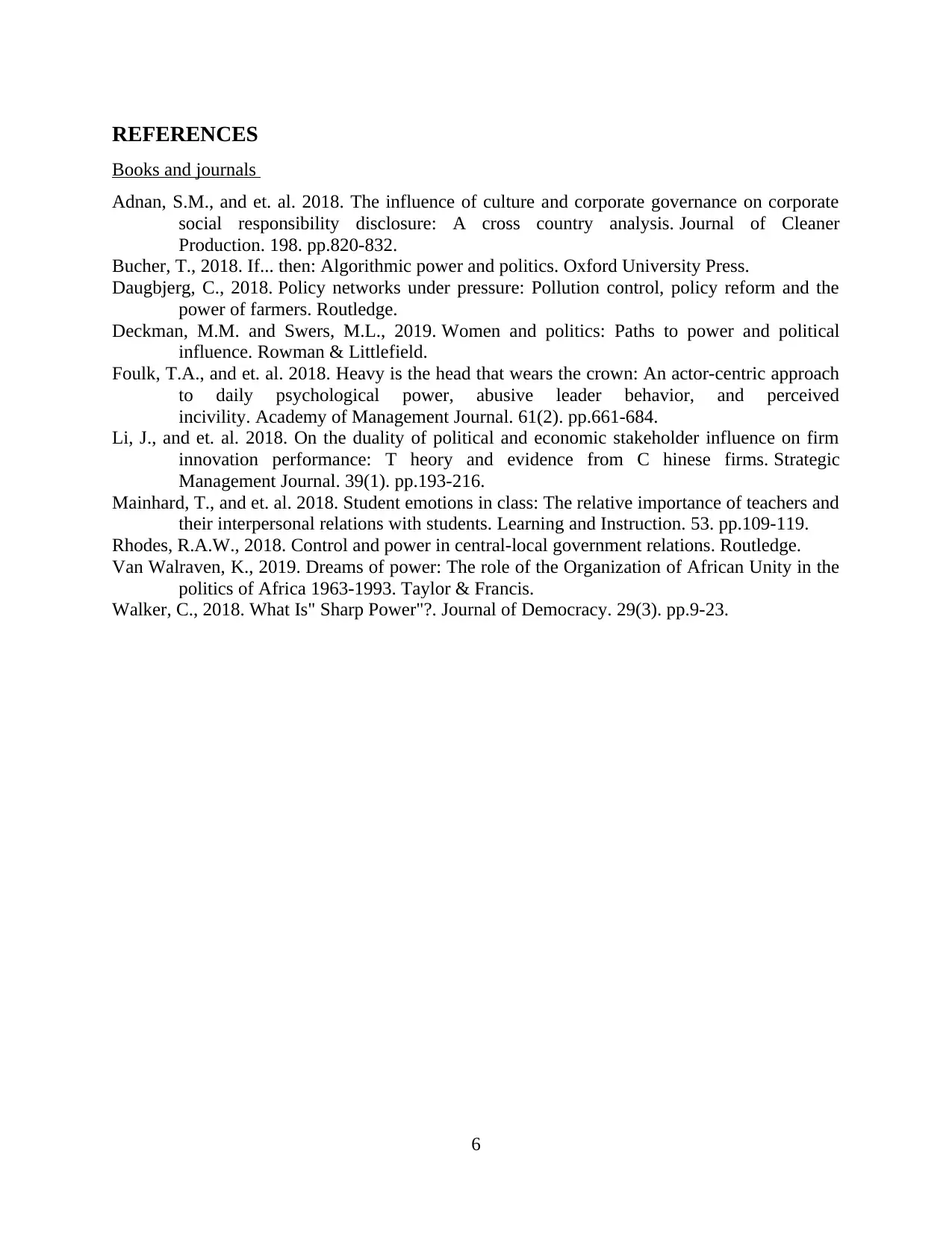
REFERENCES
Books and journals
Adnan, S.M., and et. al. 2018. The influence of culture and corporate governance on corporate
social responsibility disclosure: A cross country analysis. Journal of Cleaner
Production. 198. pp.820-832.
Bucher, T., 2018. If... then: Algorithmic power and politics. Oxford University Press.
Daugbjerg, C., 2018. Policy networks under pressure: Pollution control, policy reform and the
power of farmers. Routledge.
Deckman, M.M. and Swers, M.L., 2019. Women and politics: Paths to power and political
influence. Rowman & Littlefield.
Foulk, T.A., and et. al. 2018. Heavy is the head that wears the crown: An actor-centric approach
to daily psychological power, abusive leader behavior, and perceived
incivility. Academy of Management Journal. 61(2). pp.661-684.
Li, J., and et. al. 2018. On the duality of political and economic stakeholder influence on firm
innovation performance: T heory and evidence from C hinese firms. Strategic
Management Journal. 39(1). pp.193-216.
Mainhard, T., and et. al. 2018. Student emotions in class: The relative importance of teachers and
their interpersonal relations with students. Learning and Instruction. 53. pp.109-119.
Rhodes, R.A.W., 2018. Control and power in central-local government relations. Routledge.
Van Walraven, K., 2019. Dreams of power: The role of the Organization of African Unity in the
politics of Africa 1963-1993. Taylor & Francis.
Walker, C., 2018. What Is" Sharp Power"?. Journal of Democracy. 29(3). pp.9-23.
6
Books and journals
Adnan, S.M., and et. al. 2018. The influence of culture and corporate governance on corporate
social responsibility disclosure: A cross country analysis. Journal of Cleaner
Production. 198. pp.820-832.
Bucher, T., 2018. If... then: Algorithmic power and politics. Oxford University Press.
Daugbjerg, C., 2018. Policy networks under pressure: Pollution control, policy reform and the
power of farmers. Routledge.
Deckman, M.M. and Swers, M.L., 2019. Women and politics: Paths to power and political
influence. Rowman & Littlefield.
Foulk, T.A., and et. al. 2018. Heavy is the head that wears the crown: An actor-centric approach
to daily psychological power, abusive leader behavior, and perceived
incivility. Academy of Management Journal. 61(2). pp.661-684.
Li, J., and et. al. 2018. On the duality of political and economic stakeholder influence on firm
innovation performance: T heory and evidence from C hinese firms. Strategic
Management Journal. 39(1). pp.193-216.
Mainhard, T., and et. al. 2018. Student emotions in class: The relative importance of teachers and
their interpersonal relations with students. Learning and Instruction. 53. pp.109-119.
Rhodes, R.A.W., 2018. Control and power in central-local government relations. Routledge.
Van Walraven, K., 2019. Dreams of power: The role of the Organization of African Unity in the
politics of Africa 1963-1993. Taylor & Francis.
Walker, C., 2018. What Is" Sharp Power"?. Journal of Democracy. 29(3). pp.9-23.
6
1 out of 8
Related Documents
Your All-in-One AI-Powered Toolkit for Academic Success.
+13062052269
info@desklib.com
Available 24*7 on WhatsApp / Email
![[object Object]](/_next/static/media/star-bottom.7253800d.svg)
Unlock your academic potential
Copyright © 2020–2026 A2Z Services. All Rights Reserved. Developed and managed by ZUCOL.




